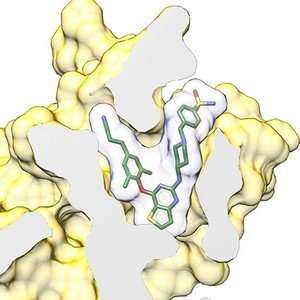A newly developed inhibitor (compound 25a) binds to human immunodeficiency virus (HIV) reverse transcriptase, a viral protein essential for HIV replication. Credit: Yale University
Antiretroviral therapies have worked wonders suppressing HIV replication and its progression to AIDS, but their effectiveness is deteriorating due to the constant development of drug resistance in the virus. Now Yale researchers have shown their newly developed compounds maintain anti-HIV activity against drug-resistant mutants better than FDA-approved medications.
The new compounds work by inhibiting the function of a viral enzyme, called reverse transcriptase, which is essential for HIV replication. The researchers report in the online journal eLife that high resolution images of viral crystal structures reveal the new inhibitors bind to both the "wild-type" and the mutant forms of the reverse transcriptase.
Examinations of the structures and results from biochemical assays show that the new reverse transcriptase inhibitors, "were better able to adopt their shapes'' to bind to mutant HIV reverse transcriptase than existing agents, said Yang Yang, a postdoctoral researcher in the laboratory of Yale professor and Nobel laureate Thomas A. Steitz and first author of the study.
More information: Yang Yang et al. Structural basis for potent and broad inhibition of HIV-1 RT by thiophene[3,2-d]pyrimidine non-nucleoside inhibitors, eLife (2018). DOI: 10.7554/eLife.36340
Journal information: eLife
Provided by Yale University




















